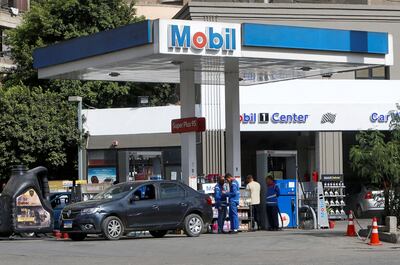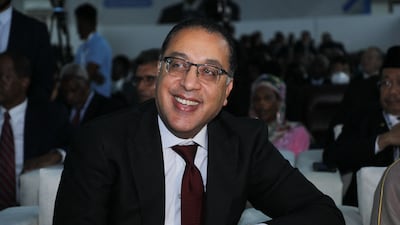Egypt’s prime minister on Thursday sought to head off possible disgruntlement over a sharp rise in fuel prices, explaining in a televised 30-minute address the lengths to which the government goes to shield the poor from the fallout of the Ukraine war.
“This government is an integral part of the people and we are keen on standing side by side with the people to hear their views and listen to their problems,” Mostafa Madbouly said.
“We do this so that we can together confront the unprecedented challenges Egypt, like all other world nations, faces under the shadow of the global crisis."
Mr Madbouly’s comments came a day after his government raised fuel prices by more than 7 per cent. However, the one increase that will have the most impact on the economy is that of diesel, which is widely used for the transport of goods and passengers across the country of 103 million, as well as the vital agriculture sector.
The price of diesel was raised on Wednesday by 0.50 pounds, or 7.4 per cent, to 7.25 pounds ($0.38) a litre following a state quarterly review introduced since 2019.

Other types of fuel were raised by a similar amount, while the highest octane petrol was raised by one pound to 10.75 pounds per litre.
Mr Madbouly said the increases reflected soaring energy prices resulting from the Ukraine war, but still left the government with a heavy fuel subsidy bill.
Egypt imports 100 million barrels of oil a year and managed to entirely remove fuel subsidies by the end of 2020, he said. But the situation changed when the Ukraine war broke out in February, with a barrel of oil now sold at around $120 — twice the price on which the budget for the fiscal year, which ended on June 30, was calculated, and $35 more than the estimate for the current year.
“Did we raise the price of petroleum products to reflect the new prices? Absolutely not,” Mr Madbouly said.
He said a litre of diesel was costing the government 11 pounds, but was being sold at 6.75 pounds before Wednesday’s increase, the first in three years.
Even with the increase, the government will be subsidising diesel alone to the tune of 55 billion pounds in the fiscal year, which ends on June 30 next year.
“The government bears the biggest part of the increases [in global prices] and passes on a small part to the citizens,” Mr Madbouly said. “Egypt is one of 10 countries where the price of diesel is the lowest in the world.”
However, the likely impact of the fuel increase on a wide range of goods and services has triggered an uproar on social media, with many lamenting the difficulties they already face to make ends meet.
Mr Madbouly said provincial governors had been instructed to ensure that nationwide transport charges are not raised beyond the percentage by which fuel prices went up.
Egypt has struggled to fend off the fallout on its economy from the war in Ukraine after the devastating impact of the coronavirus pandemic, including a sharp rise in wheat prices.

Often the world’s largest wheat importer, Egypt is now paying $500 a tonne compared with $260 before the war, which raises the cost of bread subsidies benefiting more than 70 million Egyptians, Mr Madbouly said.
The uncertainty created by the war also led to a flight of “foreign” dollars — estimated at $20 billion — once invested in Egyptian treasury bills. It also halted the arrival of tourists from Russia and Ukraine, who once accounted for 31 per cent of all foreign visitors.
Inflation rose to 15.3 per cent in May, compared with just 4.9 per cent in the same month last year, deepening the hardship faced by most Egyptians.
The government responded to the crisis by taking painful measures to keep the economy afloat. These included devaluing the currency by about 14 per cent in March and negotiating with the International Monetary Fund on economic restructuring that could also involve borrowing from the Washington-based lender.
Saudi Arabia and the UAE, Egypt’s closest Arab allies and backers, have pledged billions of dollars in investments and central bank deposits.
Mr Madbouly tried to allay gloom over the state of the economy by pointing out that what Egypt faced was part of a global crisis that, he predicted, would take a similar place to the two World Wars in the history books.
He said unemployment was currently at 7.5 per cent, half what it was in 2014, the year President Abdel Fattah El Sisi — the driving force behind efforts to overhaul the economy — took office.
“We are all very keen to raise the income of Egyptians,” he said. “Until this moment, Egypt does not have large natural resources, but it is the expansion of production and development through mega projects that will bring about improvement to people’s lives.”


